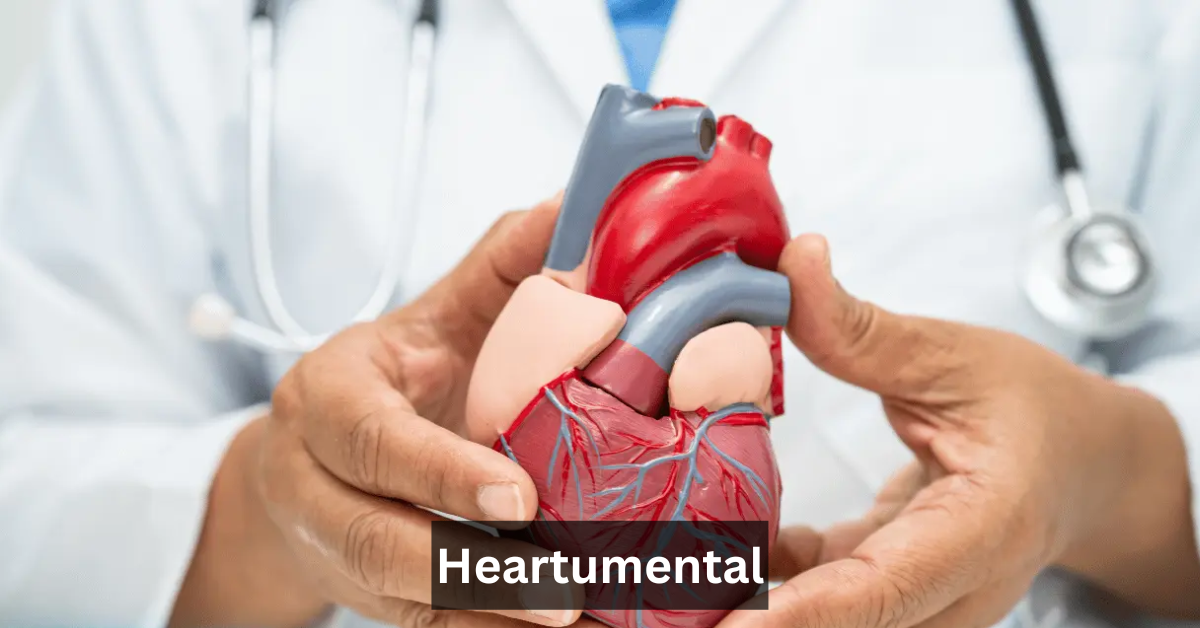Heartumental is an emerging approach to holistic wellness that emphasizes the profound connection between the heart and the mind. Unlike traditional health frameworks that separate physical, emotional, and mental well-being, heartumental integrates these dimensions, creating a synergistic path toward overall wellness. At its core, heartumental focuses on emotional resilience, mindfulness, and heart-centered living to enhance both psychological and physiological health.
The concept blends insights from psychocardiology, neuroplasticity, and positive psychology to cultivate a life that is not only healthier but more emotionally fulfilling. It encourages individuals to connect with their inner emotions while maintaining cognitive clarity, creating a lifestyle that nurtures both body and mind.
In recent years, there has been a growing awareness of how emotional and mental well-being directly impact heart health. Studies from institutions like the American Heart Association and the HeartMath Institute highlight the connection between stress, emotional regulation, and cardiovascular outcomes. This has sparked a movement toward practices that support heart-centered living, emphasizing mindfulness, meditation, and emotional intelligence.
People are increasingly looking for ways to manage stress, improve mental clarity, and enhance their wellness journey holistically. Heartumental provides a structured framework to achieve these goals, blending science-backed strategies with practical lifestyle applications.
Modern life is characterized by rapid changes, high stress, and constant digital connectivity, which can challenge emotional balance. Heartumental offers a roadmap for individuals seeking emotional healing and psychological wellness. By adopting heart-centered practices, people can improve cognitive health, manage stress effectively, and foster resilience, leading to a more balanced and fulfilling life.
The Science Behind Heartumental
Understanding Psychocardiology
Psychocardiology is the study of the interaction between psychological factors and heart health. Research shows that chronic stress, depression, and anxiety can negatively affect cardiovascular function. Conversely, emotional well-being and positive psychological states can promote better heart health.
The integration of psychocardiology into heartumental practices allows individuals to recognize how emotional patterns influence physiological health. Techniques such as stress management, mindfulness, and emotional intelligence training are scientifically proven to reduce heart-related risks.
The Heart-Mind Connection Explained
The heart is not merely a pump; it communicates with the brain via complex neural, hormonal, and electromagnetic pathways. This heart-brain connection affects mood, decision-making, and cognitive function. Monitoring physiological markers like Heart Rate Variability (HRV) can provide insights into emotional states and overall well-being.
By understanding this connection, heartumental encourages practices that synchronize emotional and cognitive processes, promoting both mental clarity and cardiovascular health.
Role of Neuroplasticity in Emotional Health
Neuroplasticity refers to the brain’s ability to reorganize itself by forming new neural connections. Through consistent heartumental practices—such as meditation, mindfulness, and gratitude exercises—individuals can rewire their neural pathways, enhancing emotional resilience and adaptive responses to stress.
Neuroplasticity reinforces that emotional patterns are not fixed. By intentionally practicing heart-centered strategies, people can strengthen both emotional intelligence and cognitive health, leading to lasting improvements in mental and heart health.
Emotional Intelligence and Heartumental Living
Defining Emotional Intelligence
Emotional Intelligence (EI) is the capacity to recognize, understand, and manage one’s own emotions while navigating the emotions of others effectively. High EI is associated with improved interpersonal relationships, stress management, and overall life satisfaction.
Heartumental leverages EI to enhance both mental and heart health. By cultivating self-awareness, self-regulation, empathy, and social skills, individuals can create healthier emotional environments that support heart-centered living.
How Emotional Awareness Impacts Heart Health
Emotional states like anger, anxiety, or chronic stress can trigger physiological responses such as increased blood pressure and inflammation, which negatively impact heart health. By developing emotional awareness, individuals can identify and mitigate these stress responses, improving cardiovascular function and promoting resilience.
Research from the HeartMath Institute demonstrates that individuals with higher emotional awareness exhibit improved HRV, reduced stress, and better overall health outcomes, confirming the importance of EI in heartumental practices.
Practical Tips to Boost Emotional Intelligence
To cultivate emotional intelligence within a heartumental framework:
- Practice Mindfulness: Observe thoughts and emotions without judgment to increase self-awareness.
- Reflect Daily: Journaling emotional experiences fosters insight and regulation.
- Develop Empathy: Actively consider others’ perspectives to enhance relational intelligence.
- Manage Stress Proactively: Use breathing exercises and meditation to regulate emotional responses.
Mindfulness and Meditation Practices
Mindfulness Techniques for Heart Health
Mindfulness is the practice of focusing on the present moment with awareness and acceptance. It has been shown to reduce stress, lower blood pressure, and improve emotional resilience. Simple daily practices like mindful walking, eating, or breathing can foster psychological wellness and promote heart-centered living.
Guided Meditation for Emotional Balance
Guided meditation helps individuals regulate emotions, release tension, and improve cognitive health. Techniques often include visualization, affirmations, and focused attention, aligning mental and emotional states for optimal well-being.
Breathing Exercises to Reduce Stress
Deep, intentional breathing activates the parasympathetic nervous system, which counteracts stress responses. Exercises like diaphragmatic breathing, alternate nostril breathing, and box breathing can reduce anxiety, improve HRV, and enhance emotional resilience.
The Role of Self-Care in Heartumental Wellness
Daily Rituals for Emotional Resilience
Daily self-care practices such as morning mindfulness, physical activity, and journaling support mental health and heart function. These rituals create stability, reduce stress, and build emotional endurance for daily challenges.
Gratitude Practices and Journaling
Regular gratitude exercises cultivate positive emotional states. Journaling about daily experiences reinforces psychological wellness, promotes emotional healing, and enhances personal development.
Sleep, Nutrition, and Heart-Centered Living
Adequate sleep and balanced nutrition are critical for heart and brain health. Foods rich in omega-3s, antioxidants, and fiber, combined with 7-9 hours of restorative sleep, support both cognitive health and emotional well-being. Heartumental emphasizes integrating these basics into a mindful lifestyle.
Technological Tools Supporting Heartumental Practices
Heart Rate Variability (HRV) Monitoring
HRV is a key metric of autonomic nervous system balance. Tracking HRV helps individuals identify stress patterns, optimize recovery, and maintain emotional resilience. Devices and apps that monitor HRV provide actionable insights to enhance heart-centered living.
Biofeedback Devices for Emotional Awareness
Biofeedback tools allow individuals to observe physiological signals such as heart rate, skin conductance, and respiration. By providing real-time feedback, these devices help regulate emotions, reduce stress, and reinforce mindfulness practices.
Apps and Platforms for Mind-Heart Alignment
Digital platforms offer guided meditations, HRV monitoring, and emotional journaling, supporting consistent heartumental practices. Tools like these bridge scientific insight with practical application for everyday wellness.
Heartumental in Lifestyle and Culture
Incorporating Heartumental Principles in Work-Life Balance
Balancing professional demands with personal well-being is central to heartumental living. Strategies include mindful scheduling, intentional breaks, and heart-centered communication to maintain emotional balance.
Heart-Centered Relationships and Communication
Strong interpersonal connections improve both emotional intelligence and heart health. Active listening, empathy, and compassionate dialogue are essential practices for nurturing relationships within a heartumental framework.
Creative Expression and Emotional Well-Being
Art, music, and writing serve as emotional outlets, promoting mental clarity and psychological wellness. Engaging in creative activities allows emotional release and reinforces heart-centered practices.
Read Also: 5StarsStocks.com Healthcare: Unlocking Profitable Stocks
Case Studies and Real-Life Applications
Research Highlights from the HeartMath Institute
The HeartMath Institute has extensively studied heart-brain coherence. Their findings show that coherent heart rhythms correlate with improved emotional regulation, better cognitive performance, and enhanced resilience.
Stories of Transformative Heartumental Experiences
Individuals practicing heartumental methods report reduced stress, stronger relationships, and heightened self-awareness. Personal narratives illustrate the tangible benefits of integrating heart-centered practices into daily life.
Lessons from Psychocardiology Studies
Psychocardiology research underscores the impact of emotions on cardiovascular outcomes. Studies highlight that stress reduction, meditation, and emotional intelligence training improve heart health and overall well-being.
Challenges and Misconceptions
Common Myths About Emotional and Heart Health
Many believe emotional well-being is separate from physical health. Evidence from psychocardiology and the American Heart Association disproves this, showing a strong link between mental states and cardiovascular function.
How to Overcome Emotional Roadblocks
Challenges like emotional suppression or chronic stress can hinder heartumental practices. Techniques such as CBT, mindfulness, and biofeedback provide structured pathways to overcome these obstacles.
Ensuring Scientific Credibility in Heartumental Practices
Integrating heartumental practices requires reliance on evidence-based research. Using validated tools and consulting reputable sources like the HeartMath Institute and peer-reviewed studies ensures safe and effective implementation.
Future of Heartumental Wellness
Emerging Trends in Heart-Centered Health
Technological advancements in wearable devices, AI-guided mindfulness apps, and biofeedback platforms are shaping the future of heartumental wellness. Personalized programs are making heart-centered practices more accessible globally.
Integrating Technology, Psychology, and Lifestyle
The integration of digital tools with traditional wellness strategies enhances emotional intelligence, stress management, and overall holistic wellness. Heartumental is increasingly becoming a lifestyle choice rather than a niche practice.
Predictions for the Next Decade
Heart-centered practices are expected to become mainstream, with wellness programs emphasizing emotional resilience, mindfulness, and heart-brain coherence as essential components of modern living.
Frequently Asked Questions
Can heartumental practices improve cardiovascular health?
Yes. Research in psychocardiology demonstrates that stress management, mindfulness, and emotional intelligence reduce heart-related risks and improve overall heart health.
How does neuroplasticity relate to heartumental living?
Neuroplasticity allows the brain to adapt to new emotional and cognitive patterns, reinforcing heart-centered habits and enhancing emotional resilience.
Are there tools to support heartumental practices?
Yes. HRV monitors, biofeedback devices, and wellness apps provide feedback to optimize emotional balance and cognitive health.
How long does it take to see benefits from heartumental practices?
Results vary, but consistent daily practices such as meditation, gratitude journaling, and mindfulness can yield noticeable improvements in emotional well-being and stress management within weeks.
Is heartumental supported by scientific research?
Absolutely. Institutions like the HeartMath Institute and studies cited by the American Heart Association validate the benefits of heart-centered wellness practices.
Summary
Heartumental blends science, mindfulness, and emotional intelligence to cultivate holistic wellness. It emphasizes that emotional healing and heart-centered living are inseparable from mental and physical health.
Start small: incorporate daily mindfulness exercises, track HRV, journal gratitude, and prioritize self-care. Over time, these practices compound, enhancing emotional resilience and cognitive health.
By embracing heartumental principles, individuals can experience a profound transformation—achieving balance, clarity, and emotional fulfillment. It is more than a wellness trend; it is a scientifically supported, heart-centered lifestyle for the modern age.



